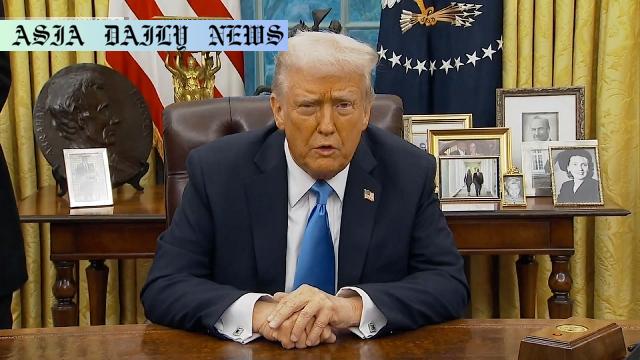Trade Talks – President Trump highlights significant progress during the Geneva economic negotiations with China amidst rising tensions.
Trade Talks show a breakthrough as Trump’s team and Chinese officials engage in high-level discussions.
Discussions in Geneva marked the first significant meeting since tariff measures were imposed.
Trump is optimistic about the outcomes, focusing on opening China’s markets to US businesses.
The tensions spotlight deep trade issues between the two largest global economies.

Introduction: Trade Talks and Progress in Geneva
The trade tensions between the United States and China have been a global focal point for months. With both economies imposing steep tariffs on each other’s goods, the stakes have never been higher for negotiations. President Donald Trump recently hailed the ‘great progress’ made during the latest round of trade talks held in Geneva, Switzerland. This meeting marks the first significant attempt at resolution since the introduction of reciprocal tariffs amidst escalating trade pressures. In the critical discussions, high-ranking officials from both nations deliberated on pathways to resolve their differences.
Key Highlights of the Meeting
The US delegation was led by Treasury Secretary Scott Bessent and Trade Representative Jamieson Greer, while China was represented by Vice Premier He Lifeng. According to sources, the first day of negotiations extended well into the evening as both sides worked through key sticking points. President Trump, in a social media update on the summit’s progress, emphasized the constructive and friendly nature of this engagement, noting substantive agreements on various fronts.
A major focus of these discussions was on facilitating greater access for American businesses to the Chinese market. Trump hinted at reducing some tariff measures, provided certain agreements are upheld as talks progress. This comes amidst Beijing’s firm stance against what it perceives as unfair tariff impositions from Washington.
Global Implications of the Negotiations
The world has closely monitored these negotiations, given their implications for the global economy. The US and China represent the two largest economies in the world, and their strained relationship risks rippling across international trade markets. As the first day concluded on a positive note, hopes are high for a sustainable reset in their trade dynamics.
Improved trade relations could benefit both countries significantly. Increased Chinese market access for American goods would bode well for US businesses, especially those involved in manufacturing, agriculture, and technology sectors. For China, resolving the tariff dispute could stabilize its export-dependent industries and preserve essential bilateral relations that anchor its international trade framework.
Challenges to Achieving a Comprehensive Agreement
Despite these advancements, significant challenges loom over the negotiations. Beijing remains staunchly opposed to Washington’s unwavering tariff expectations, and assurances on intellectual property rights enforcement, market fairness, and other key issues are yet to be resolved. The delicate balance between cooperation and competition fuels skepticism about whether these initial agreements can materialize into long-term solutions.
Furthermore, domestic pressures will influence both negotiation teams. President Trump has faced scrutiny over the impact of tariffs on domestic constituents, while Chinese leadership is tasked with balancing international concessions with national pride.
Conclusion: A Step Towards Resolution
The Geneva discussions offer a vital step towards repairing US-China trade relations. While much remains unresolved, the progress noted by Trump and echoed by other key stakeholders injects a sense of optimism into an otherwise tense global trade environment. The second day of talks and subsequent interactions will likely determine whether this newfound momentum translates into tangible policy changes.
For global economies, the hope remains that continued dialogue steers the world’s two largest economies away from prolonged trade conflicts and towards a future of mutual cooperation.



Commentary
The Significance of Trade Talks in a Global Economy
The recently concluded first day of US-China trade negotiations offers not only a glimpse into the complexities of high-stakes diplomacy, but also a ray of hope for global markets seeking stability. The focus on creating pathways for mutual benefit, as emphasized by President Trump, demonstrates the necessity of fostering cooperation amidst conflict. Such high-level discussions bring to light the importance of communication between economic powerhouses.
Balancing Tariff-related Tensions
The imposition of tariffs has undoubtedly disrupted market dynamics, but it can also serve as a wake-up call—pushing both nations to address deeper, longstanding trade concerns. Trump’s indication that certain tariffs could be lifted, based on the progress of the discussions, is a step in the right direction. Flexibility in negotiations, while maintaining a firm stance on critical issues, is key to achieving a workable resolution.
A Broader Perspective on Global Trade.
For the global community, these talks carry tremendous weight. Trade wars do not benefit nations in isolation; instead, they trigger a domino effect, impacting investors, businesses, and consumers worldwide. The Geneva talks offer more than just a bilateral agreement—they present an opportunity for creating a blueprint for fairer, more resilient global trade practices.
Looking Ahead
As Sunday’s talks resume, there is a pressing need for both sides to remain committed to long-term solutions rather than short-term victories. Achieving this balance could set a benchmark not only for US-China relations but also for how global powers manage economic challenges. An optimistic end to these negotiations would resonate far beyond Geneva, potentially ushering in a new era of economic diplomacy.